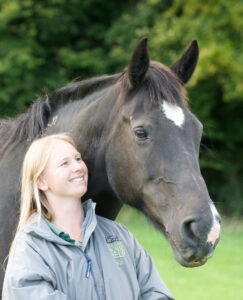Would your horse choose to be with you?
If you’d like, you can listen to the audio version of this blog here.
The lady in the stable opposite did nothing but moan. “I’ve been up half the night. No one told me the taps at the yard were frozen. I’ve got far too much to do; I don’t need this.”

Until this lady arrived, I’d been having a lovely time treating a beautiful black mare. She’d bucked her rider off a few weeks earlier, and her owner had asked me to check her over. I’d found some restriction in movement through her ribcage, which might create pain that could explain her ridden behaviour. She was yawning and yawning and yawning as the restriction eased and the movement improved.

When the grumbling started in the stable opposite, I had to work to keep myself ‘in my bubble’ so that the negative energy didn’t impact me and the treatment I was giving. It made me wonder, how do the horses feel about this? So often, we arrive at the yard bringing the stresses of the day with us or the after-effects of a lack of sleep. We offload onto our horse or our friends at the yard. Or we don’t even recognise our bad mood and carry the negative energy around.
This week’s task is to recognise how you feel emotionally before you get to your horse, and consider the impact that your actions relating to those emotions might have on you, your horse, and those around you. As Victor Frankl said, “Between stimulus and response, there is a space. In that space is our power to choose our response.” You can only decide whether or not you want to act differently by first recognising how you feel.

If it’s helpful, you can subscribe to my YouTube channel, where I’m releasing a daily gratitude short (for example, this one), or follow my Facebook page, where I share a daily gratitude post (for example, this one) and a daily gratitude reel (for example, this one), as well as much more.

The Parable of the Two Arrows
The Buddha once asked his student, “If a person is struck by an arrow, is it painful?”
The student nodded, yes.
The Buddha then asked, “If a person is struck by a second arrow, is that even more painful?”
The student again nodded, yes.
The Buddha then explained, “In life, we cannot always control the first arrow. However, the second arrow is our reaction to the first. The second arrow is optional.”
If you’d like, you can listen to the audio version of this blog here.
 Sue Palmer MCSP, aka The Horse Physio, is an award-winning Chartered Physiotherapist who promotes kind and fair treatment of horses through education with empathy.
Sue Palmer MCSP, aka The Horse Physio, is an award-winning Chartered Physiotherapist who promotes kind and fair treatment of horses through education with empathy.
Her popular books include ‘Harmonious Horsemanship’ (co-authored with Dr Sue Dyson), ‘Understanding Horse Performance: Brain, Pain or Training?’ and ‘Horse Massage for Horse Owners’. These, and some excellent online courses, are available here.
Sue is registered with the RAMP, the ACPAT, the IHA, the CSP and the HCPC.